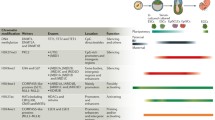Abstract.
During cell differentiation or metabolic switch, cells undergo profound changes in gene expression. These events are accompanied by complex modifications of chromosomal components and nuclear structures, including covalent modifications of DNA and chromatin up to topological reorganization of chromosomes and genes in the nucleus. To various extents, all these levels of organization appear to contribute to the stability and heritability of transcription programmes and define what is meant as the epigenomic level of gene regulation. Indeed, damage or perturbation of epigenome components may lead to deviations from a determined cellular programme, resulting in severe developmental disorders and tumour progression. Most recent data also suggest that tissue regeneration and transdifferentiation are controlled by epigenetic functions. Thus, the epigenome provides the molecular basis for the preservation and also for the plasticity of cell identity.
Similar content being viewed by others
Author information
Authors and Affiliations
Corresponding author
Additional information
Received 22 September 2007; received after revision 13 December 2007; accepted 25 January 2007
Rights and permissions
About this article
Cite this article
Lanzuolo, C., Orlando, V. The function of the epigenome in cell reprogramming. Cell. Mol. Life Sci. 64, 1043 (2007). https://doi.org/10.1007/s00018-007-6420-8
Published:
DOI: https://doi.org/10.1007/s00018-007-6420-8




